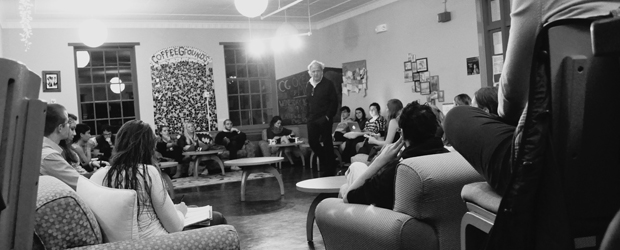by Samantha Shuba
The circular lights of Coffee Grounds looked warm and inviting from the dark, rainy sidewalk of Cro Boulevard. The atmosphere inside, however, was politically charged this past Tuesday night, October 23. Susan Eckert Lynch ’62 Professor of Government and International Relations Alex Hybel gave a talk entitled “Fear Itself” on foreign policy in light of the previous evening’s presidential debate. This talk was a part of a series put together by the REF (Residential Education Fellows) program specifically dealing with the 2012 campaign.
The series, entitled “REF Gives You Election Cycle 2012”, was put together to give student voters different perspectives on the upcoming election, especially concerning the debates. This was also largely made possible through Professor of Philosophy Larry Vogel’s seminar. Professor Hybel’s talk promised to be both informative and hilarious; many students arrived at Coffee Grounds early, eager to partake in dialogue with him.
The first words out of Hybel’s mouth were, “I did not watch the debate last night.” This comment surprised many, and caused a few laughs, until everyone realized that he was serious. He followed up by saying that he read a transcript of the night’s debate instead, and received a few sighs of relief.
Hybel had very strong opinions throughout his talk, but managed to stay relatively neutral, not insinuating personal bias at any time or implying who he will be voting for. He announced that it was fairly obvious during the debate that Mitt Romney has no expertise in foreign policy, but then added that in 2008, neither did President Obama. The rest of his thesis seemed to revolve around that very idea.
“I tell many of my students going into international relations this: you may come with great plans, but invariably you have to deal with the constraints of the world,” he said.
With this insight, he told his captivated audience that though Mitt Romney may seem to have different ideas about foreign policy than Obama, in all likelihood, they would end up being roughly the same idea. Many in crowd found this intriguing, and whispers erupted around the room. Hybel had a great deal of proof to back up his opinion.
Hybel’s first example was former President George W. Bush. He cited September 11, saying that Bush had intended to take a strong stand against China economically, and rely extensively on the Department of Defense, but that tragic day in September changed everything. There are some things that are just impossible to predict. However, especially in the Middle East, Hybel said that there will be very few changes, especially in Egypt and Syria.
“Professor Hybel added valuable insight to a complex topic,” Hannah Beazley ’15 said. “He did not oversimplify, in fact, he made it easier for students to understand.”
Hybel spent a lot of time talking about the Middle East, but he also touched on United States’ relationships with Latin America, Asia and Africa. He said that the Federal Government tends to think of Latin America as a second thought, which will be a mistake in future years. He also commented on Romney’s jabs at Obama’s apparent lack of control over imports from China; in Professor Hybel’s opinion, there is nothing more that Romney could do to “crack down” on China; Obama is doing everything possible.
In regards to Africa, Hybel stated that there is little to be said. However, Al Qaeda seems to be trending toward setting up camps in situations of political turmoil, which are common in some parts of African nations. Hybel warned against this and hopes that the United States will turn more attention to African countries in the future.
After about forty-five minutes of lecture from Hybel, he then took questions. Students asked about everything from nuclear weapons to drones to the absence of any mention of Secretary of State Hillary Clinton’s involvement in foreign policy. At the end, Hybel gave a prediction for the outcome for the election. He warned students to watch Pennsylvania and Ohio, but also Colorado and Nevada. In his opinion, they will be the states that make the difference this election.
“Professor Hybel showed that he is able to explain the often convoluted intricacies of international politics in very clear and easy to grasp manner. His presentation of the major issues that the world faces once again assured me that foreign policy should play a much greater role in this year’s election. As an international student from a NATO country, I deem the individual candidates‘ determination to both verbal and actual support of American allies as a factor worth considering,” Vladimir Chlouba ’16 said. •










